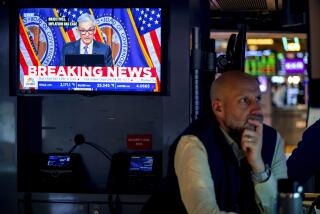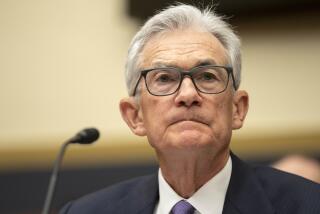Fed chief Yellen indicates stimulus cuts will continue
WASHINGTON — The Federal Reserve is trying to figure out how much of the recent economic slowing was caused by the harsh winter weather, a determination that could prompt it to reconsider how fast it pulls back on its key economic stimulus.
In testimony Thursday before the Senate Banking Committee, Fed Chairwoman Janet L. Yellen said the cold weather had a role in the string of data that “have pointed to softer spending than many analysts had expected.”
Among that data, she said, were the weak reports on job growth, housing, retail sales and industrial production.
“Part of that softness may reflect adverse weather conditions, but at this point, it’s difficult to discern exactly how much,” Yellen said.
Asked whether the Fed could consider a change in its reduction of its bond-buying stimulus program, she said: “Certainly we would be open to reconsidering, but I wouldn’t want to jump to conclusions.”
Yellen’s testimony, her first in the Senate as the Fed’s new chief, came about two weeks after she took questions from lawmakers in the House as part of the Fed’s semi-annual briefing to Congress on monetary policy and the economy.
Although Yellen cited the weak economic data since her House appearance, she stuck to the view that the economy was recovering and indicated that it would take a significant turn in data before she pushed for a pause in the unwinding of bond purchases.
The Fed’s bond purchases have been aimed at stimulating growth by lowering long-term interest rates. In late December, under then-Fed Chairman Ben S. Bernanke, policymakers announced the start of a gradual tapering of the program, believing the economy was firmly on a path of improving growth.
“Altogether, her testimony suggests to us that the Fed has a high bar for altering its taper plans,” said Michael Gapen, an economist at Barclays Bank.
He said he expected Fed policymakers to continue to trim their purchase of Treasury and mortgage securities by $10 billion at their next meeting in March, to be followed by subsequent cuts until the program is completely shut down in October.
They already have made two cuts of $10 billion a month each, reducing the monthly bond buying to $65 billion from $85 billion. The purchases have swelled the Fed’s assets to more than $4 trillion.
Democrats cautioned Yellen against withdrawing monetary support too quickly and asked whether the economy should be boosted with fiscal stimulus, including such programs as extended unemployment benefits.
Like Bernanke, Yellen declined to endorse fiscal policy actions. Instead, she said that government belt-tightening had imposed a “substantial drag” on the recovery while also putting a bigger onus on the Fed to take action.
“At a minimum, I would hope that fiscal policy would do no harm,” she said.
Many analysts have attributed the recent disappointing economic statistics to the unusually cold winter, which has hampered travel, slowed some business activity and kept customers away from stores and restaurants.
Generally, though, the analysts expect the recovery to pick up strength in the coming months.
Yellen’s comments were largely consistent with this thinking. “I do think the economy is beginning to recover, and we have made progress,” she said.
On the long-running debate over a higher minimum wage, Yellen said that although it would help low-wage earners, the trade-off would be some negative effect on employment.
The Congressional Budget Office recently said the White House proposal to raise the minimum wage to $10.10 an hour would help 900,000 people rise above the poverty line but would lead to the loss of half a million jobs.
The White House has criticized the report, but Yellen took the side of the CBO, saying that the nonpartisan congressional agency was “as qualified as anyone to evaluate the literature.”
Stocks rose after Yellen’s testimony. The Dow Jones index of blue-chip firms rose 74.24 points, or 0.5%, to 16,272.65. The broader Standard & Poor’s 500 index climbed 9.13, or 0.5%, to 1,854.29. And the technology-oriented Nasdaq index added 26.87 points, or 0.6%, to close at 4,318.93.
Analysts said investors took heart in her remarks that the economic weakness was at least partly weather related and that the Fed planned to stay on course in slowing its bond purchases.







